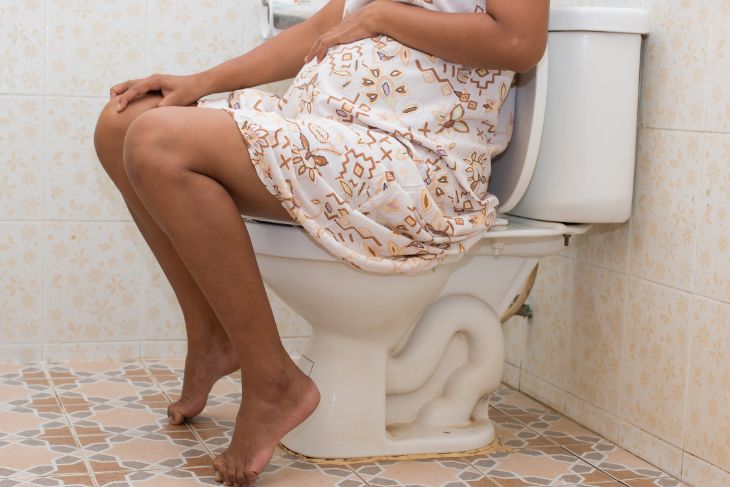Constipation During Pregnancy: Causes, Risks, And Remedies

Can’t remember the last time you went number two? Are you feeling gassy, bloated, and clogged up? You might just be constipated.
But don’t worry, mama, you’re not alone.
Constipation is a common complaint among pregnant women. It could even be one of the first signs that you’re expecting. But, that doesn’t mean you have to suffer. There are some things you can do to help get things moving and stay regular again.
In this post, we will cover the causes, risks, and remedies of constipation during pregnancy. We’ll even let you know which over-the-counter meds are considered safe to take.
Contents
What Causes Constipation In Pregnancy?
Constipation can be quite unpleasant, but unfortunately extremely common during pregnancy – some reports say up to 44% of women experience it (source). As your belly gets bigger the pressure of your growing uterus on your rectum only exacerbates the issue.
There are a number of reasons that could be the cause of your pregnancy constipation.
It might even be a combination of them:
- Progesterone levels: What can’t you blame on hormones? Progesterone levels are elevated during pregnancy, and this hormone is known to relax the muscles in the digestive tract, causing food to pass slowly through the intestines (source).
- Iron supplements: Although iron is an important nutrient during pregnancy, constipation can be a side effect of getting too much. Iron supplements are notorious for causing GI upsets, so you may need to speak with your midwife or doctor about switching to a prenatal vitamin with less iron. They might also suggest you change the iron supplement, the dose or how often you take it. Make sure you follow the instructions because anemia is very common in pregnancy and can be a cause of health issues for mom and her baby (source). Always communicate any side-effects you might experience with your healthcare provider.
- Dehydration: Pregnancy makes you more prone to dehydration, as your body is using more water to help form the placenta and amniotic sac. If you’re dehydrated, your body struggles to perform routine functions, and it can even lead to some severe complications.
- Lack of activity: As your belly gets bigger, it can become harder to stay active, or at least stay motivated, which is important for keeping you regular.
- Stress: Pregnancy can be a stressful time, especially as you get closer and closer to your due date. Your brain and your gut talk back and forth, and stress can start holding everything up. Try to avoid worrying too much, as this can affect movement too.
- Growing uterus: Your uterus grows and grows and it pressures your rectum, especially late in the pregnancy. This compression can interfere with your bowel movement.
There’s also a chance your constipation may not be pregnancy-related at all and could be due to a low-fiber diet, too much dairy, or a new medication.
Some foods you should stay away from if you are suffering from constipation include bananas, fried foods, potato chips, red meat, white bread, white rice, white pasta, and dairy products.
Can Constipation Be Harmful To My Baby?
Constipation isn’t usually a cause for concern during pregnancy, but occasionally it can be a symptom of another problem. Be sure to call your OB or midwife if you have constipation accompanied by severe abdominal pain, alternating with diarrhea, or if you pass any blood or mucus.
As long as you’re not in labor, straining to pass a bowel movement should not hurt you or your baby. It could cause or worsen hemorrhoids, which are uncomfortable, but nothing to be overly concerned about.
This increase in pressure, like you feel like you have to pass a bowel movement, could be associated with contractions though.
Listen To Your Body
10 Constipation Remedies
If you find yourself having difficulty going to the toilet, you may need to try these ten pregnancy-safe home remedies to get things moving again.
- Plenty of Fluids: Drinking lots of water throughout the day will help flush things through. Make sure you’re getting at least ten 8-ounce glasses of water a day to replace lost fluids. This can even help with constipation caused by taking iron supplements. If it’s hot outside or if your activity level is high – you should take more fluids correspondingly.
- Get Moving: Moving helps things get moving! Walking, swimming and yoga are all great exercises for your pregnant body.
- Warm Bath: A nice warm soak will help relax your stomach muscles and will encourage stools to move through. A nice warm soak will help relax you and your stomach muscles and will encourage stools to move through.
- Increase Fiber Intake: High-fiber foods help remove undigested food from your intestines and into the toilet. Broccoli, berries, beans, brown rice, and green leafy vegetables all work wonders to help you go.
- Drink Lemon Water: Take the juice from half a lemon, mix it into a glass of water, and drink before you go to bed. The water helps soften the stool, and the lemon has a high acidic content, which works on the GI tract to get things moving (source).
- Eat ‘P’ Foods: Many ‘P’ foods contain sorbitol, which acts as a laxative. Pears, prunes, peaches, peas, and pumpkin all work great for remedying constipation. I would drink a glass of prune juice when I would get backed up when I was pregnant with baby No. 2, and it worked every time.
- Up Your Vitamin C: High doses of vitamin C are known to attract water into your intestinal tract and soften your stool. . Be sure not to go over 2,000 milligrams per day though, including your prenatal vitamin. That’s the upper limit, but latest recommendations suggest that pregnant women older than 18 should take 85 mg of vitamin C per day (source). New research points against routine vitamin C supplementation unless advised by your healthcare provider (source). Rather, you should try eating foods that are high in vitamin C, like broccoli, bell peppers, and strawberries.
- Add in Some Probiotics: The probiotic strains of Lactobacillus and Bifidobacterium encourage healthy bowels and help regulate the digestive system. Yogurt and kefir are both great options for adding in some healthy gut bacteria to your diet. And guess another natural source of probiotics? Pickles!
- Magnesium-rich Foods: Magnesium directs water to the intestines, makes the stools softer and easier to pass. Be sure you’re getting 350 milligrams per day by eating magnesium-rich foods, such as dark chocolate, spinach, nuts, and fish (source).
- Use a Squatty Potty: The angle makes all the difference when it comes to pooping, and the squatty potty puts your body into a squatting position that helps prevent straining, constipation, and even hemorrhoids. Plus, it also helps you with getting ready to push during labor!
Continue to drink lots of fluids, stay active, and consume foods with fiber, probiotics, and magnesium throughout your pregnancy. These are vital for a healthy pregnancy and will help prevent your constipation from returning.
You’ll be happy to know that those prenatal vitamins you are taking can also help with constipation, especially folic acid. You can also enjoy the benefits of the vitamin B complex, and vitamin B5, in particular, can help not only with constipation but also with those annoying leg cramps. You can get it from egg yolks, whole grains, avocado, sweet potato, sunflower seeds, broccoli (source).

Editor's Note:
Dr. Irena Ilic, MDAre There Any OTC Medications I Can Take?
If home remedies aren’t working for you, you may need to talk with your doctor or midwife about trying a laxative or stool softener.
Here are some over-the-counter medications that are generally considered safe to take during pregnancy and your provider may suggest (source):
- Colace (docusate sodium): Your doctor might have you try a stool softener, like Colace, first before turning to laxatives. The active ingredient in stool softeners is minimally absorbed by the body, so there is very little chance it could pass to or harm your baby in any way.
- Milk of Magnesia (magnesium hydroxide): This is a mild laxative you may need to try if a stool softener alone doesn’t do the trick. Milk of Magnesia may have a yucky taste, but it works like a charm for many expecting moms.
- Metamucil (psyllium): Metamucil is another safe option your provider may suggest. It is a bulk-producing laxative that draws water into the stools, making them softer and easier to pass. It’s also used as a fiber supplement.
Bisacodyl (Dulcolax) and senna are both stimulant laxatives that have been found to be safe in pregnancy. Because they are stimulants, though, they can cause abdominal cramps and diarrhea and can lead to dehydration. Some recommendations state that bisacodyl should be avoided during the first trimester. Senna should be taken with caution, and only if your doctor recommends. (source). Always make sure to talk with your healthcare provider before taking any OTC medications during pregnancy.
Note that some natural constipation remedies, supplements or OTC products can make you bloated, cause cramping or diarrhea. Make sure you let your doctor know of any symptoms you might experience while taking any of these.

Editor's Note:
Dr. Irena Ilic, MDWhat Medications Should I Avoid?
Always be sure to avoid polyethylene glycol and magnesium citrate while expecting, as these could possibly harm your baby.
Castor oil must also be avoided, as it can cause irregular and painful contractions, which can be stressful on mom and baby, and possibly even lead to labor. It may also cause your baby to pass meconium before delivery, which often leads to complications after birth (source).
Play It Safe
Combat Your Constipation
Being backed up is rather unpleasant, yet a fairly common occurrence for many expecting moms, thanks to hormones, stress, and sometimes iron supplements. Straining from constipation can be uncomfortable and cause hemorrhoids, but generally isn’t a cause for concern during pregnancy.
Try taking a warm bath, upping your vitamin C, and eating some prunes, pears, and papayas to try to get things moving again. Staying hydrated, eating high fiber foods, exercising, and adding some probiotics into your diet will help to keep you regular.
But don’t be embarrassed to talk to your doctor or health care provider if things don’t seem to be improving.






No comments:
Post a Comment